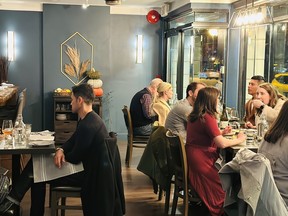Vancouver eateries Cowdog Coffee and Folke are reaping success with living-wage, no-tip service

Can a no-tipping policy work in a restaurant or café?
There are a couple of Vancouver eateries that say yes, for sure.
It has already paid off its initial loan — not bad for what began as a pop-up for friends in their own small Mt. Pleasant apartment selling $1 cups of coffee.
“We’re coming up on two years of working on this,” said Ryan Leenstra, who owns Cowdog with Joe Lee.
Leenstra, 27, and Lee, 29, both Alberta natives, complement each other, Leenstra with his service-industry background and Lee with his social-media savvy and marketing chops.

Paying a living wage and banning tips was always a big part of the business plan.
“You go to a restaurant in Australia, New Zealand, other places around the world, the tipping culture isn’t there, and (workers) are still able to make enough money,” Leenstra said.
“I feel like (tipping) creates a stressor between guests and servers, I think great service should be standard. … I don’t think service should be transactional.”
British Columbians tip in the neighbourhood of $2.5 billion a year, based on Statistics Canada data that shows the province’s eating and drinking establishments earn $15 billion in annual sales.
The only regions with higher hourly living wages than Metro Vancouver are Whistler’s $28.09 and Clayoquot Sound’s $27.42.
A lot of patrons at each restaurant have told staff, in person and in social media comments, that they feel like they have been invited into someone’s home, not a business.
“Guests love the no-tipping model, and now that most know it is a living wage, they appreciate it even more,” said Pricilla Deo, Folke co-owner with fellow chef Colin Uyeda. “It has given a lot of people more incentive to dine with us based on that.
“A lot of people say the service is so genuine and welcoming. It really does create a different dining experience.”

The B.C. Restaurant and Foodservices Association is not aware of any other eating establishments in B.C. with no-tipping policies.
“I’d say 99.99 per cent of places are tipping restaurants,” Ian Tostenson, the association’s president and CEO, said. “Those two are the only ones I’m aware of.”
“I think it’s a great thing what they (Folke and Cowdog) are doing,” he added.
Were a restaurant to approach the association for suggestions or guidance on introducing no tipping, Tostenson said he’d advise caution based on two past non-tipping restaurants, on Vancouver Island and on Denman Street in Vancouver, that failed.
“What our advice would be, for a restaurant where you have sit-down table service, where a service is actually being provided and not just passing something across the counter, be very careful because the ones that have tried that in B.C. in the past were not successful,” he said.
“On the other hand, a tipping culture rewards individual effort and merit,” he said.
“Those are choices, there’s not one that’s right and one that’s wrong. … I certainly applaud and welcome any business that wants to find another model and can succeed at that, that’s great.”
But if an employer can ensure a safe environment and that workers are still making a livable wage supplemented by tips, that’s great, too, he said.
At Cowdog, Leenstra sat at a window table watching a guest sip a warm pistachio white-chocolate matcha whipped up by barista Kadein Jewitt, the stone-milled green tea grown in the shade in Japan.
To cover the cafe’s higher wages, the drink costs more than similar fare at, say, Starbucks. At Cowdog, it’s $8.50, while a venti matcha tea latte costs $6.55.
But customers are willing to line up on weekend afternoons for Cowdog’s drinks.
Their idea being the success it has, Leenstra and Lee have visions of expansion, and not just somewhere in downtown Vancouver, but to Toronto, New York and beyond.
“We’d love to expand,” Leenstra said. “We’re looking at opportunities.”